Kickresume's latest survey reveals that office romances aren't as rare as we might think. The study shows that nearly a third, specifically 33%, of working adults have been involved in a workplace romance.
With the upcoming Valentine's Day casting a spotlight on romance, Kickresume decided to survey 1,002 workers to delve deeper into the hushed subject of office romances. By gathering robust data, our aim was to shed light on and answer the lingering questions that surround workplace affairs.
Here’s what we found in a nutshell:
- 33% workers have been involved in an office romance
- 27% office romances ended in serious relationships (13%), or marriages (14%)
- 11% respondents admitted that one partner left the company post-breakup
- 56% employees would stay in their job after a theoretical break-up
- 3% would turn to HR for mediation or conflict resolution support in case of a break-up
- 15% participants labeled office romances as a “bad” thing
- 54% workers rank post-breakup tension and awkwardness as the top office romance risk
- 40% respondents noted that office romances sparked gossip among colleagues
- 41% workers are unaware of their own organization’s romance policy
- Nearly 50% would keep their office romance from HR
Nearly one third of workers confess to an office romance
According to our survey results, 33% of workers have been involved in an office romance. Yes, it turns out offices aren’t just spaces for work, sometimes they're also the backdrop for budding love stories.
But let's not forget about those who never made it past the crush stage at work. Our survey tells us that 17% of working adults admit to having an office crush, even if it didn't lead to more.
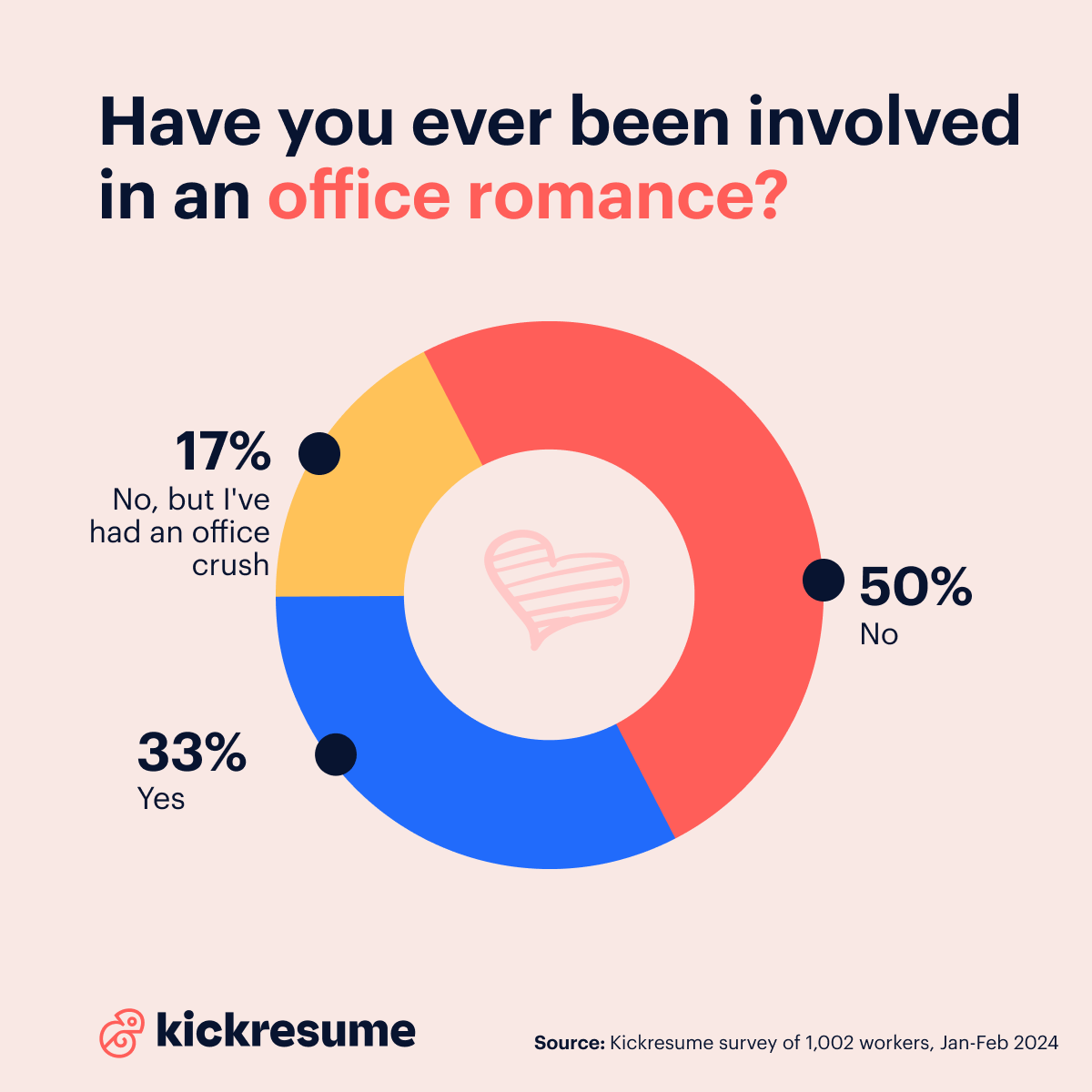
Almost 40% of office romances result in no more than flirting
We also explored just how far office romances typically progress among our respondents. And interestingly enough, flirting emerges as the most common outcome — in 38% of cases.
On the other hand, for 27% of survey respondents, the connections made in the office went beyond mere flirtation or one date. These romances ended in serious, ongoing relationships (13%), or even led to marriage (14%).
This could imply that a professional setting, where employees share common goals, interests, and often spend significant time together, can fuel not only playful flirtation but also foster deeper relationships.
But while some office romances deepen with time, there are stories that end on a sour note. In fact, 21% of our survey participants reported that their office romances resulted in breakups.
What’s more, the number of respondents where one partner left the company post-breakup (11%) indicates the potential professional implications of office romances.
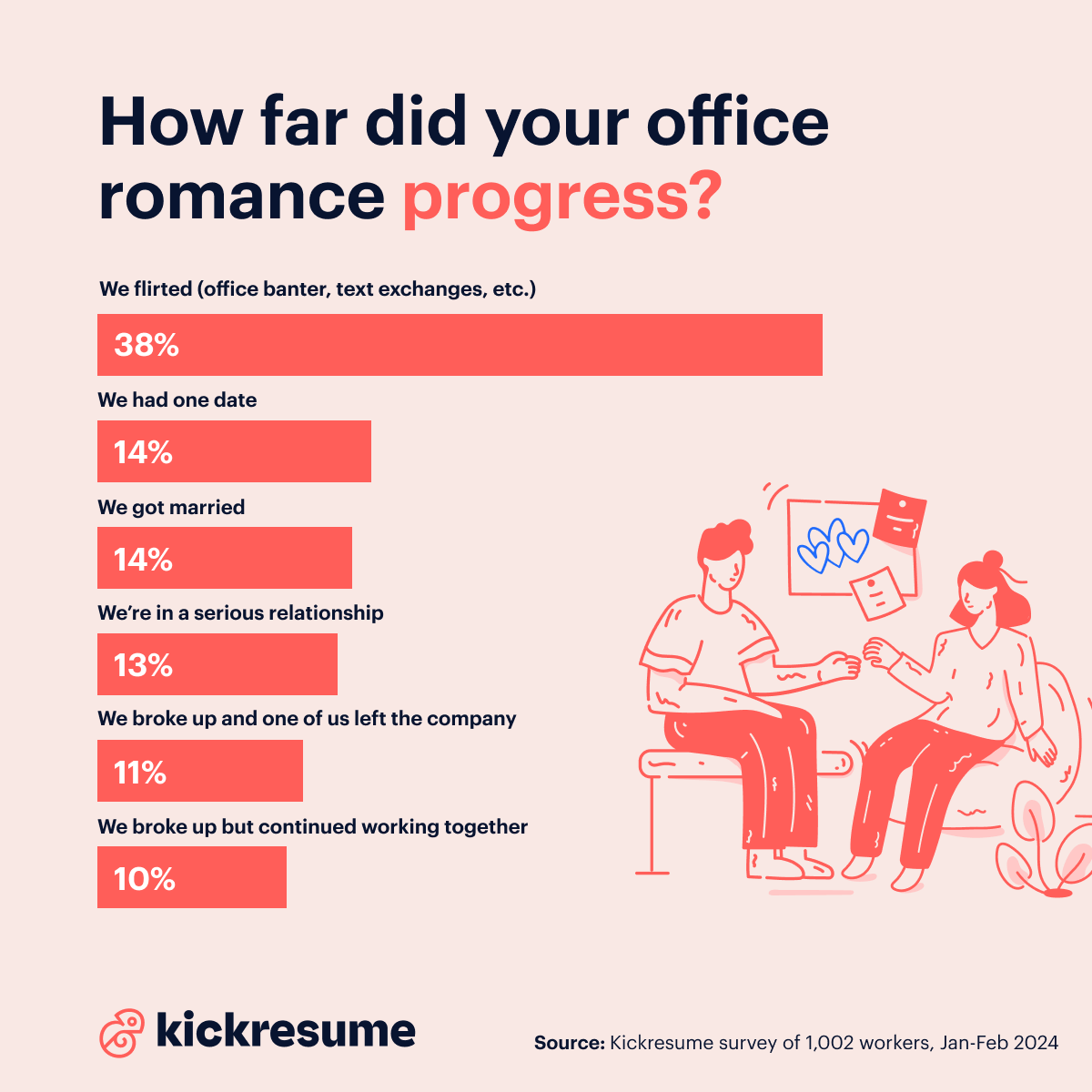
Survey says 56% would stay in their job after a break-up
Office romances can be fraught with challenges, especially when they end in breakups. That's why we asked survey participants how they'd deal with an office split.
Interestingly, over half of the respondents (56%) said they would stay professional and continue working with their ex-partner.
But what about the rest? Here, the responses varied:
- 18% stated they were unsure about how they'd handle an office breakup
- 8% expressed a more avoidant approach, saying they would ignore the other person
- 8% admitted they would consider leaving their job
- 7% would request a move to a different team or department
- Only a mere 3% would turn to HR for mediation or conflict resolution support.
It's likely that working in close quarters after a breakup could be uncomfortable or even untenable. And so, this data suggests that personal relationships can dramatically impact workplace dynamics and career decisions.
What's more, the fact that only a small fraction would seek HR support could indicate a lack of trust or confidence in the department to handle personal matters effectively. Or it could simply mean a desire to cope with personal issues without involving the workplace. One way or another, this may underline the need for HR departments to communicate their role and ability to provide support in sensitive situations more effectively.
Office romances: A good thing or a bad thing?
The world of office romances is not painted in black and white. There's a spectrum of opinions on whether it's a boon or a bane. And out of the 1,002 participants who voiced their viewpoints, the majority fell somewhere in the middle.
The biggest group (47%) believed that whether an office romance was a good or bad thing depends on the circumstances. A slightly more indifferent group emerged next, with 21% remaining neutral on the issue.
However, 15% of participants shared a negative view, labeling office romances as a “bad” thing.
Meanwhile, the optimists made up roughly 12% of the respondents, viewing office romances as a “good” thing — possibly due to increased happiness, better teamwork, or improved work satisfaction.
Office romance risk rank: 54% fear tension if relationship ends
Given the different perspectives on office romances, it's possible that the uncertainty or negative views stem from perceived risks. So what are people’s worst fears when it comes to having an office romance?
More than a half of survey participants (54%) identified post-breakup tension or awkwardness as the top concern of an office romance.
While the aftermath of a breakup tops the list, it's not the only worry. Conflicts of interest, especially when a manager is involved, concern 43% of people. And about two-fifths (41%) worry about balancing professional and personal boundaries.
At the bottom of the list, laudably unfazed, 9% of the respondents saw no potential risks in an office romance.
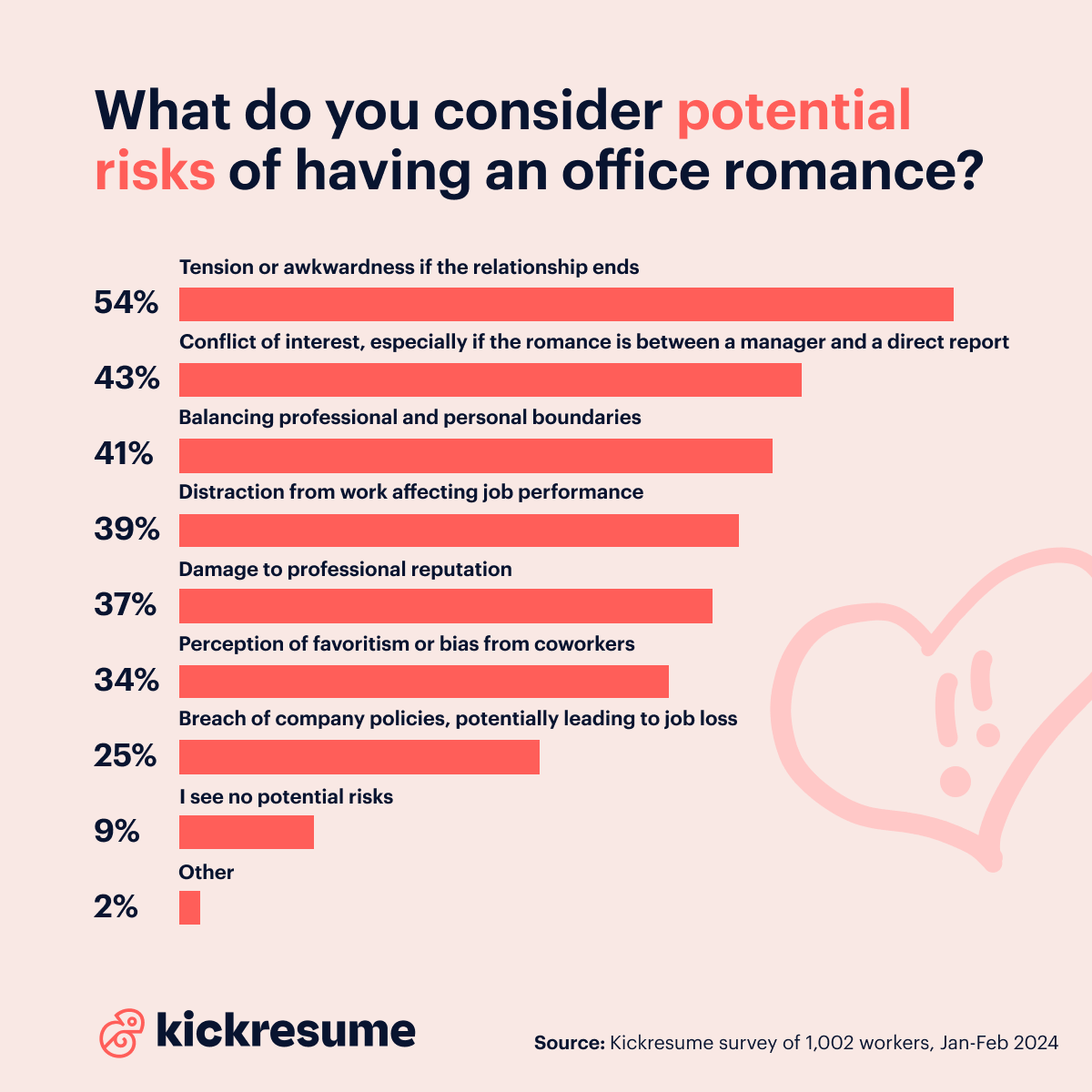
Understanding these anxieties can help organizations address potential issues proactively. At the same time, it can assist employees in navigating their personal relationships in the workplace with greater awareness and care.
Office romance leads to gossip for 40% participants
Understanding just how much our workplaces can become a second home, it's vital to look at how office romances might impact them.
Among the respondents, 40% noted that office romances sparked gossip among colleagues. And another 31% of participants noticed casual flirting in the workplace.
Beyond just talk and harmless flirting, office romances occasionally escalated into more serious situations. A total of 27% respondents revealed that they had experienced workplace drama as a result of an office romance, bringing unnecessary unrest in professional relationships.
Adding to this, perceived favoritism linked to office romances was reported by 24% participants, which could lead to negative perceptions of professional fairness and potentially disadvantage others in the workspace.
However, office romances did not prove to be problematic or distracting for everyone. Less than one fifth (19%) of respondents felt their work was disrupted due to workplace affairs around them.
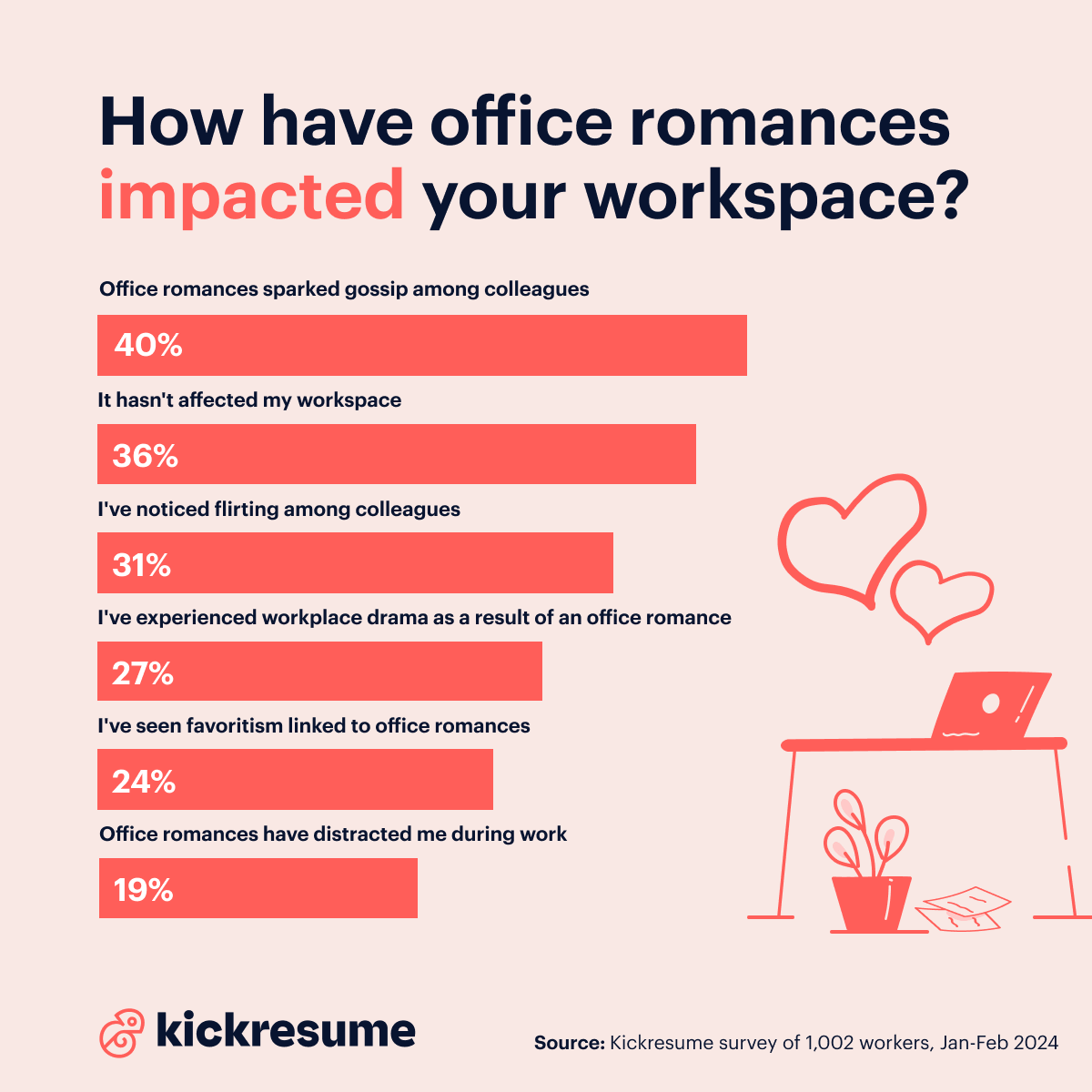
Over 40% workers are unaware of their own firm's romance policy
When asked about their organization's policy on office romances, a surprising 41% of the workers were unaware of any existing protocol.
On the other hand, 31% of respondents work in organizations where office romances are allowed but come with certain restrictions. While for 15%, such relationships are strictly prohibited.
A smaller fraction — 14 percent — reported that their workplace is fully open and accommodating of office romances.
Almost 50% would keep their office romance from HR
While the data reflects varied policies on office romances, the practical issue lies in transparency. When office relationships do form, would individuals disclose it to their HR department or manager?
Almost half of the respondents (49%) would prefer to keep their office relationship private, choosing not to disclose it. A further 23% would only inform their boss or HR if the relationship becomes serious.
Overall uncertainty was also apparent, with 21% of respondents expressing that they were unsure if they'd disclose a potential office romance. Only a mere 7% said they would inform HR or their boss immediately.
These findings reveal a clear correlation. The lack of awareness or ambiguity regarding office romance policies might play a part in employees' hesitance in disclosing such relationships. This only highlights the need for clear, well-communicated policies regarding workplace affairs, fostering an open and comfortable work environment for everyone involved.
“The workplace is no longer just a place to work — it has expanded to become a social environment, a place to build strong connections” says Peter Duris, CEO at Kickresume. "However, managing romance in a workspace calls for maturity, discretion, and a solid understanding of company policies. And so, the role of well-communicated policies on office romances becomes paramount within organizations. This not only promotes integrity and transparency, but also ensures that everyone feels comfortable in their shared working environment."
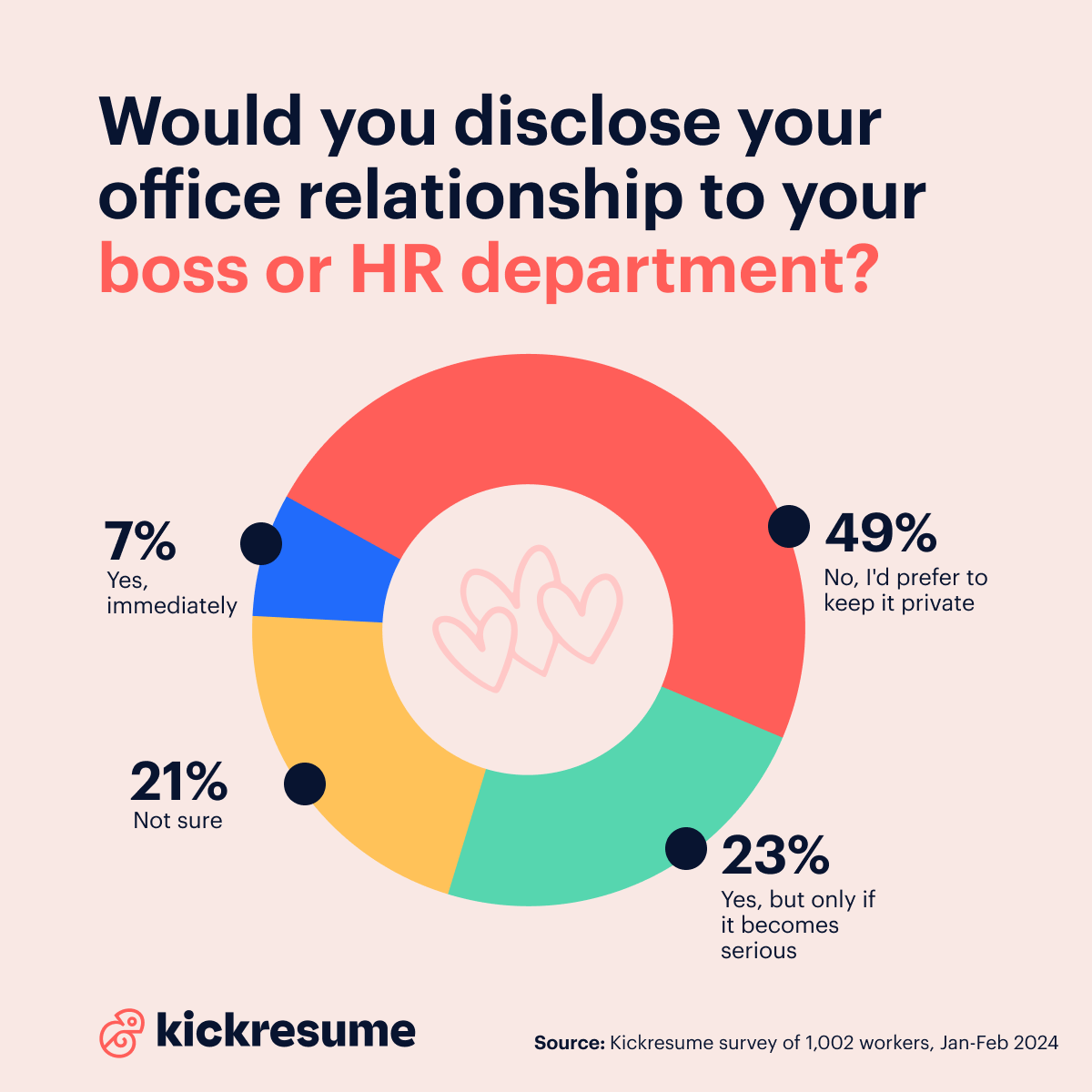
A lighter take: Best spots for an office date
When asked to rank various workplace locations in terms of the best spots for an office date, our respondents shared some noticeable preferences.
The coffee station came out on top of the list with the average rank at 3.9, perhaps due to the casual, hearty conversations that often brew along with the coffee.
The rooftop, with its potential for romantic views and private chats, took the second spot at a close 4.0. The parking lot claimed the third spot with an average rank of 4.7.
Meanwhile, workstation cubicles — due to their apparent lack of privacy — seem to be the least attractive spot scoring 5.5.
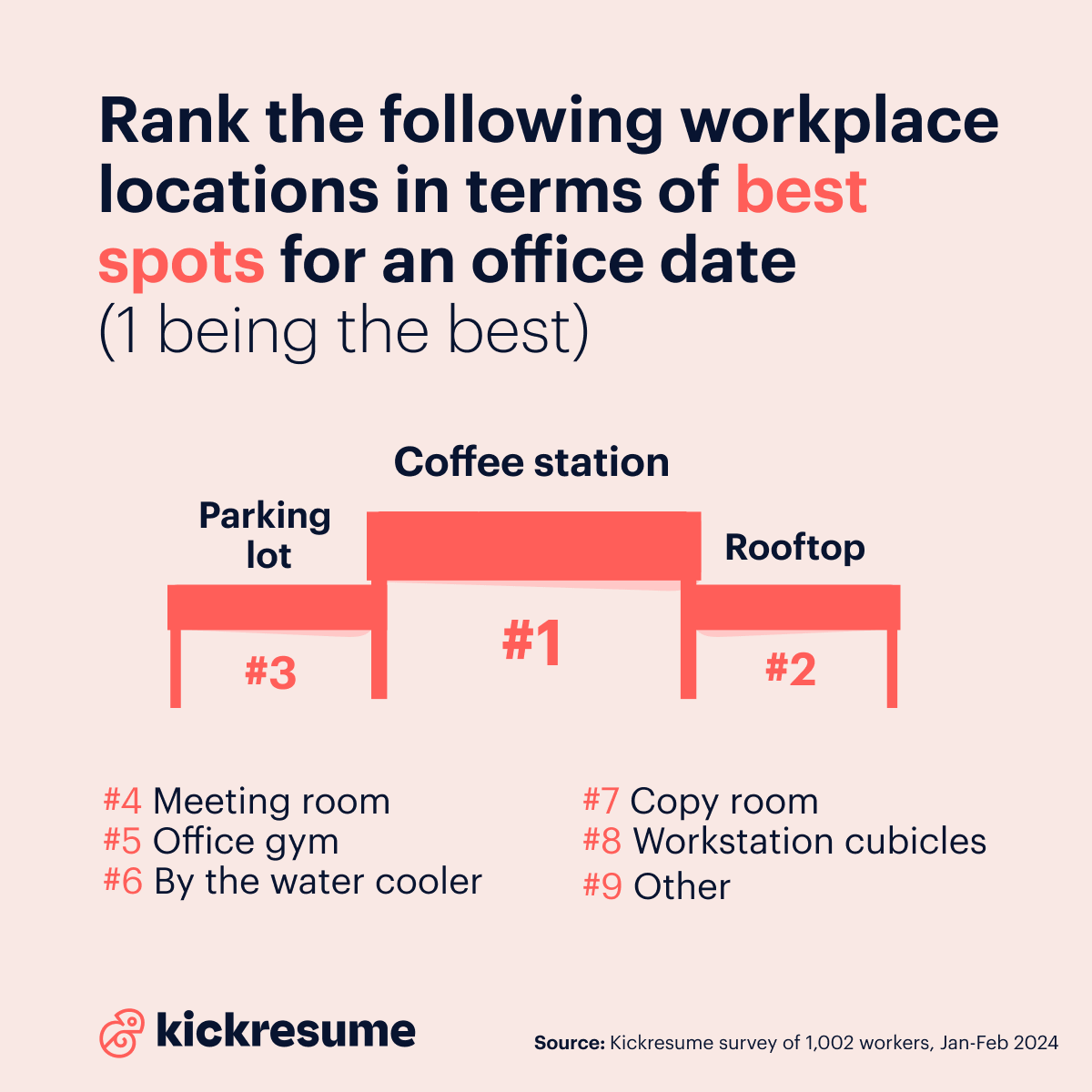
Note
This anonymous online survey was conducted by Kickresume from January 28 to February 5 2024. Collecting the responses of 1,002 participants, our aim was to delve deeper into the often-overlooked dynamics of office romances.
About Kickresume
Kickresume is an AI based career tool that helps candidates source jobs and raise salary with powerful resume and cover letter tools, skills analytics, and automated job search assistance. It already helped more than 3.5 million job seekers worldwide.



